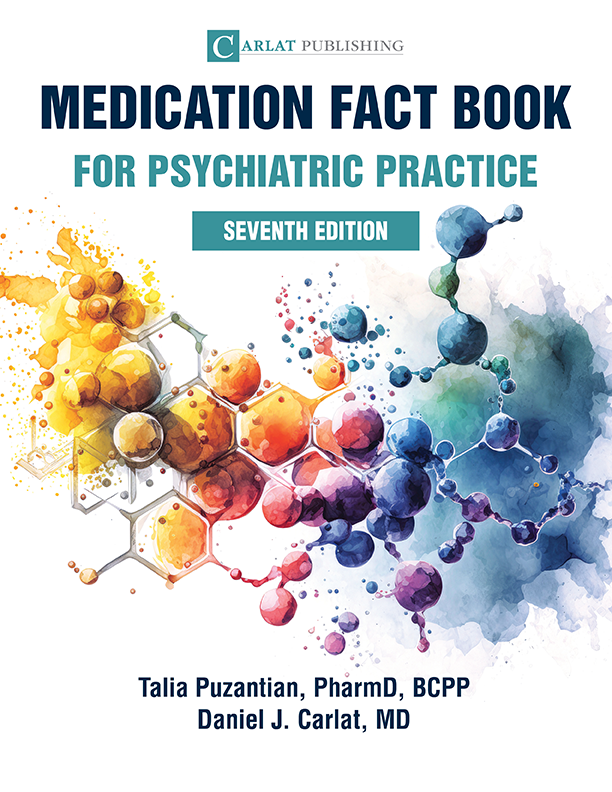Home » Breast Feeding and Psychiatric Medications: An Overview
Breast Feeding and Psychiatric Medications: An Overview
February 1, 2009
From The Carlat Psychiatry Report
Dhwani Shah, MD
Any discussion of psychiatric medications and breastfeeding must begin with the benefits of breastfeeding, which are substantial. The American Academy of Pediatrics and other medical organizations recommend that mothers exclusively breastfeed during the first six months of the baby’s life. Breast milk is considered the perfect food for nourishing infants, and breast-fed babies have lower rates of allergies, rashes, diarrhea, ear infections, and hospital admissions. Mothers benefit as well, with decreased post-partum bleeding, an earlier return to prepregnancy weight, a decreased risk of both ovarian and breast cancer, and possibly a decreased risk of osteoporosis after menopause (Pediatrics 2005; 115:496-506).
While all psychotropic medications enter the breast milk, medication exposure for a nursing infant is much less than the exposure to a fetus during pregnancy. Most authorities recommend that nursing mothers take medication immediately after breast-feeding to maximize clearance of the drug before the next feeding. However, this is unlikely to be an effective strategy during the first few months, when infants are feeding every two to three hours. As is the case for pregnant women, it is important to work with breastfeeding women to find the lowest effective dose.
Two particularly useful websites for updated information on psychotropics in breastfeeding are www.emorywomensprogram.org (Emory) and www.womensmentalhealth.org (Massachusetts General Hospital).
Antidepressants
Most studies have found that the excretion of SSRIs into the breast milk is very low, in some cases literally undetectable. A few case reports have described the following adverse effects in infants exposed to SSRIs in breast milk: increased crying, decreased sleep, gastrointestinal distress and irritability. It is not always clear that the SSRIs are to blame, because such behaviors are quite common in unexposed infants as well. Several very small studies have demonstrated no adverse long term neurobehavioral effects of SSRIs (Gentile, CNS Drugs, 2005; 19: 623-633).
Tricyclic antidepressants have also been widely used, with only one adverse event reported to date, in which doxepin caused respiratory depression (Weissman, et al., Am J Psychiatry 2004;161:1066-1078). Nine case reports have been published regarding the use of venlafaxine and breastfeeding, with no adverse effects observed. There is one case report in the literature of an infant seizure associated with the use of bupropion in a nursing mother, but causality in this case was not clear.
Antianxiety Medications
Benzodiazepines with a relatively short half life and no active metabolites, such as lorazepam and oxazepam, are found in low concentrations in breast milk and are likely safe when used at relatively low doses on an as needed basis. CNS depressant effects have been observed in infants who have been exposed to diazepam through breast milk, presumably due to its long half life (Eberhard-Gran et al., CNS Drugs, 2006;20:187-198).
Mood Stabilizers
Although valproate and carbamazepine are listed as lactation risk category 2 (usually compatible with breastfeeding) there are no published studies of the neurobehavioral impact of either of these medications. In the 41 motherinfant patients studied, one episode of thrombocytopenia and anemia occurred in an infant exposed to valproate. Reported adverse effects of carbamazepine in breast milk include cholestatic hepatitis and hyperbilirubinemia (ACOG Practice
Bulletin, 2008;4: 1001-1020). A recent study of the nursing infants of 30 women using lamotrigine demonstrated no adverse events except for mild asymptomatic thrombocytosis in seven infants out of eight infants measured for this (Newport, et al, Pediatrics, 2008; 122:223-231). There have been no reported cases of lamotrigine-induced Stevens Johnson Syndrome in neonates. Most authorities, including the American Academy of Pediatrics, discourage the use of lithium because levels tend to be quite high in the breast milk, leading to the possibility of lithium toxicity in the infant. A recent study of 10 mother-infant pairs, however, demonstrated low lithium levels in nursing infants and no significant behavioral problems, although there were several instances of transient elevations in TSH, BUN and creatinine (Viguera, 2007; Am J Psychiatry;164:342-345).
Antipsychotic Medications
An older study of breastfed infants of women who used chlorpromazine demonstrated no developmental deficits at both 16 month and five year follow up. However, another study of three breastfeeding infants who were prescribed both chlorpromazine and haloperidol showed evidence of developmental delay at 12-18 months of age (ACOG Practice Bulletin, 2008;4: 1001-1020). There are only a handful of case reports and small studies on second generation antipsychotics. Although many of the case reports demonstrate no effects on the newborn, a recent review article by Gentile recommends avoiding clozapine because of the potential risk of agranulocytosis in the infant. (Gentile, J Clin Psychiatry, 2008;69:666-673).
TCPR Verdict:
Again, it’s risk vs. benefit based on not much data
General PsychiatryWhile all psychotropic medications enter the breast milk, medication exposure for a nursing infant is much less than the exposure to a fetus during pregnancy. Most authorities recommend that nursing mothers take medication immediately after breast-feeding to maximize clearance of the drug before the next feeding. However, this is unlikely to be an effective strategy during the first few months, when infants are feeding every two to three hours. As is the case for pregnant women, it is important to work with breastfeeding women to find the lowest effective dose.
Two particularly useful websites for updated information on psychotropics in breastfeeding are www.emorywomensprogram.org (Emory) and www.womensmentalhealth.org (Massachusetts General Hospital).
Antidepressants
Most studies have found that the excretion of SSRIs into the breast milk is very low, in some cases literally undetectable. A few case reports have described the following adverse effects in infants exposed to SSRIs in breast milk: increased crying, decreased sleep, gastrointestinal distress and irritability. It is not always clear that the SSRIs are to blame, because such behaviors are quite common in unexposed infants as well. Several very small studies have demonstrated no adverse long term neurobehavioral effects of SSRIs (Gentile, CNS Drugs, 2005; 19: 623-633).
Tricyclic antidepressants have also been widely used, with only one adverse event reported to date, in which doxepin caused respiratory depression (Weissman, et al., Am J Psychiatry 2004;161:1066-1078). Nine case reports have been published regarding the use of venlafaxine and breastfeeding, with no adverse effects observed. There is one case report in the literature of an infant seizure associated with the use of bupropion in a nursing mother, but causality in this case was not clear.
Antianxiety Medications
Benzodiazepines with a relatively short half life and no active metabolites, such as lorazepam and oxazepam, are found in low concentrations in breast milk and are likely safe when used at relatively low doses on an as needed basis. CNS depressant effects have been observed in infants who have been exposed to diazepam through breast milk, presumably due to its long half life (Eberhard-Gran et al., CNS Drugs, 2006;20:187-198).
Mood Stabilizers
Although valproate and carbamazepine are listed as lactation risk category 2 (usually compatible with breastfeeding) there are no published studies of the neurobehavioral impact of either of these medications. In the 41 motherinfant patients studied, one episode of thrombocytopenia and anemia occurred in an infant exposed to valproate. Reported adverse effects of carbamazepine in breast milk include cholestatic hepatitis and hyperbilirubinemia (ACOG Practice
Bulletin, 2008;4: 1001-1020). A recent study of the nursing infants of 30 women using lamotrigine demonstrated no adverse events except for mild asymptomatic thrombocytosis in seven infants out of eight infants measured for this (Newport, et al, Pediatrics, 2008; 122:223-231). There have been no reported cases of lamotrigine-induced Stevens Johnson Syndrome in neonates. Most authorities, including the American Academy of Pediatrics, discourage the use of lithium because levels tend to be quite high in the breast milk, leading to the possibility of lithium toxicity in the infant. A recent study of 10 mother-infant pairs, however, demonstrated low lithium levels in nursing infants and no significant behavioral problems, although there were several instances of transient elevations in TSH, BUN and creatinine (Viguera, 2007; Am J Psychiatry;164:342-345).
Antipsychotic Medications
An older study of breastfed infants of women who used chlorpromazine demonstrated no developmental deficits at both 16 month and five year follow up. However, another study of three breastfeeding infants who were prescribed both chlorpromazine and haloperidol showed evidence of developmental delay at 12-18 months of age (ACOG Practice Bulletin, 2008;4: 1001-1020). There are only a handful of case reports and small studies on second generation antipsychotics. Although many of the case reports demonstrate no effects on the newborn, a recent review article by Gentile recommends avoiding clozapine because of the potential risk of agranulocytosis in the infant. (Gentile, J Clin Psychiatry, 2008;69:666-673).
TCPR Verdict:
Again, it’s risk vs. benefit based on not much data
KEYWORDS women's_issues_in_psychiatry
Issue Date: February 1, 2009
Table Of Contents
Recommended
Newsletters
Please see our Terms and Conditions, Privacy Policy, Subscription Agreement, Use of Cookies, and Hardware/Software Requirements to view our website.
© 2025 Carlat Publishing, LLC and Affiliates, All Rights Reserved.


_-The-Breakthrough-Antipsychotic-That-Could-Change-Everything.jpg?1729528747)



